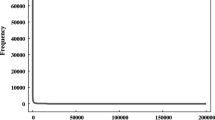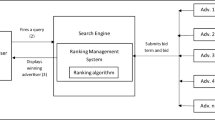Abstract
Search Engine Advertising has been widely adopted by advertisers to target potential consumers. However, the advertisers generally focus on limited popular advertising keywords, leading to fierce competition. Therefore, abundant relevant keywords need to be discovered to reduce the advertising cost. In this regard, this paper proposes a novel semantic transfer approach (named STAKS) to suggesting keyword for search engine advertising. Compared with the existing methods which explore keywords with direct relevance to the given seed keyword, STAKS can find keywords with multi-step indirect relevance through semantic paths. Moreover, three pruning strategies are designed to (1) ensure the relevance between the suggested keywords and the seed keywords, (2) narrow the semantic drift and (3) reduce the computational consumption. Data experiments show the superiority of STAKS which finds more novel keywords, owing to the indirect relevance ignored by existing methods. Therefore, STAKS is deemed effective in supporting the advertisers to achieve high advertising impressions with relatively low bidding prices.








Similar content being viewed by others
Data Availability Statement
The data used in the current study are available from the corresponding author on reasonable request.
References
Abhishek, V., & Hosanagar, K. (2007). Keyword generation for search engine advertising using semantic similarity between terms. In Proceedings of the ninth international conference on electronic commerce, ICEC’07 (pp. 89–94). https://doi.org/10.1145/1282100.1282119
Abou Nabout, N., Lilienthal, M., & Skiera, B. (2014). Empirical generalizations in search engine advertising. Journal of Retailing, 90(2), 206–216. https://doi.org/10.1016/j.jretai.2014.03.002.
Amaldoss, W., Jerath, K., & Sayedi, A. (2016). Keyword management costs and “broad match” in sponsored search advertising. Marketing Science, 35(2), 259–274. https://doi.org/10.1287/mksc.2015.0919.
Antonellis, I., Garcia-Molina, H., & Chang, C. C. (2008). Simrank++: Query rewriting through link analysis of the clickgraph (poster). In Proceedings of the 17th international conference on world wide web, WWW’08 (pp. 1177–1178). https://doi.org/10.1145/1367497.1367714
Asadpour, A., Bateni, M., Bhawalkar, K., & Mirrokni, V. (2019). Concise bid optimization strategies with multiple budget constraints. Management Science, 65(12), 5785–5812. https://doi.org/10.1287/mnsc.2018.3207.
Azad, H. K., & Deepak, A. (2019). A new approach for query expansion using wikipedia and wordnet. Information Sciences, 492, 147–163. https://doi.org/10.1016/j.ins.2019.04.019.
Bendersky, M., Metzler, D., & Croft, W. B. (2012). Effective query formulation with multiple information sources. In Proceedings of the fifth ACM international conference on web search and data mining, WSDM’12 (pp. 443–452). https://doi.org/10.1145/2124295.2124349
Bok, K., Noh, Y., Lim, J., & Yoo, J. (2019). Hot topic prediction considering influence and expertise in social media. Electronic Commerce Research,. https://doi.org/10.1007/s10660-018-09327-2.
Broder, A. Z., Fontoura, M., Gabrilovich, E., Joshi, A., Josifovski, V., & Zhang, T. (2007). Robust classification of rare queries using web knowledge. In Proceedings of the 30th annual international ACM SIGIR conference on research and development in information retrieval, SIGIR’07 (pp. 231–238). https://doi.org/10.1145/1277741.1277783
Chen, Y., Xue, G. R., & Yu, Y. (2008). Advertising keyword suggestion based on concept hierarchy. In Proceedings of the 2008 international conference on web search and data mining, WSDM’08 (pp. 251–260). https://doi.org/10.1145/1341531.1341564
Fuxman, A., Tsaparas, P., Achan, K., & Agrawal, R. (2008). Using the wisdom of the crowds for keyword generation. In Proceedings of the 17th international conference on world wide web, WWW’08 (pp. 61 – 70). https://doi.org/10.1145/1367497.1367506
Huang, H. J., Yang, J., & Zheng, B. (2019). Demand effects of product similarity network in e-commerce platform. Electronic Commerce Research,. https://doi.org/10.1007/s10660-019-09352-9.
Jiang, Z., Dan, W., & Jie, L. (2020). Distinct role of targeting precision of internet-based targeted advertising in duopolistic e-business firms’ heterogeneous consumers market. Electronic Commerce Research, 20, 453–474. https://doi.org/10.1007/s10660-019-09388-x.
Joshi, A., & Motwani, R. (2006). Keyword generation for search engine advertising. In Sixth IEEE international conference on data mining—workshops (ICDMW’06) (pp. 490–496). https://doi.org/10.1109/ICDMW.2006.104
Lathia, N., Hailes, S., Capra, L., & Amatriain, X. (2010). Temporal diversity in recommender systems. In Proceedings of the 33rd international ACM SIGIR conference on research and development in information retrieval, SIGIR’10 (pp. 210–217). https://doi.org/10.1145/1835449.1835486
Lee, M. C., Gao, B., & Zhang, R. (2018). Rare query expansion through generative adversarial networks in search advertising. In Proceedings of the 24th ACM SIGKDD international conference on knowledge discovery & data mining, KDD’18 (pp. 500–508). https://doi.org/10.1145/3219819.3219850
Lee, Y., Cho, S., & Choi, J. (2019). Determining user needs through abnormality detection and heterogeneous embedding of usage sequence. Electronic Commerce Research,. https://doi.org/10.1007/s10660-019-09347-6.
Li, H., & Yang, Y. (2020). Optimal keywords grouping in sponsored search advertising under uncertain environments. International Journal of Electronic Commerce, 24(1), 107–129. https://doi.org/10.1080/10864415.2019.1683704.
Liu, Z., Natarajan, S., & Chen, Y. (2011). Query expansion based on clustered results. Proceedings of the VLDB Endowment, 4(6), 350–361. https://doi.org/10.14778/1978665.1978667.
Lu, X., & Zhao, X. (2014). Differential effects of keyword selection in search engine advertising on direct and indirect sales. Journal of Management Information Systems, 30(4), 299–326. https://doi.org/10.2753/MIS0742-1222300411.
Mikolov, T., Sutskever, I., Chen, K., Corrado, G. S., & Dean, J. (2013). Distributed representations of words and phrases and their compositionality. In Advances in neural information processing systems (pp. 3111–3119).
Mishra, S., Verma, M., & Gligorijevic, J. (2019). Guiding creative design in online advertising. In Proceedings of the 13th ACM conference on recommender systems, RecSys’19 (pp 418–422). https://doi.org/10.1145/3298689.3347022
Nie, H., Yang, Y., & Zeng, D. (2019). Keyword generation for sponsored search advertising: Balancing coverage and relevance. IEEE Intelligent Systems, 34(5), 14–24. https://doi.org/10.1109/MIS.2019.2938881.
Qiao, D., Zhang, J., Wei, Q., & Chen, G. (2017). Finding competitive keywords from query logs to enhance search engine advertising. Information & Management, 54(4), 531–543. https://doi.org/10.1016/j.im.2016.11.003.
Sahami, M., & Heilman, T. D. (2006). A web-based kernel function for measuring the similarity of short text snippets. In Proceedings of the 15th international conference on world wide web, WWW’06 (pp. 377–386). https://doi.org/10.1145/1135777.1135834
Scholz, M., Brenner, C., & Hinz, O. (2019). Akegis: Automatic keyword generation for sponsored search advertising in online retailing. Decision Support Systems, 119, 96–106. https://doi.org/10.1016/j.dss.2019.02.001.
Schultz, C. D. (2020). The impact of ad positioning in search engine advertising: a multifaceted decision problem’ heterogeneous consumers market. Electronic Commerce Research, 20, 945–968. https://doi.org/10.1007/s10660-018-9313-z.
Shekarpour, S., Höffner, K., Lehmann, J., & Auer, S. (2013). Keyword query expansion on linked data using linguistic and semantic features. In 2013 IEEE seventh international conference on semantic computing (pp. 191–197). https://doi.org/10.1109/ICSC.2013.41
Sun, L., Guo, J., & Zhu, Y. (2020). A multi-aspect user-interest model based on sentiment analysis and uncertainty theory for recommender systems. Electronic Commerce Research, 20, 857–882. https://doi.org/10.1007/s10660-018-9319-6.
Wu, H., Qiu, G., He, X., Shi, Y., Qu, M., Shen, J., Bu, J., & Chen, C. (2009). Advertising keyword generation using active learning. In Proceedings of the 18th international conference on world wide web, WWW’09 (pp. 1095–1096). https://doi.org/10.1145/1526709.1526873
Yih, W. T., Goodman, J., & Carvalho, V. R. (2006). Finding advertising keywords on web pages. In Proceedings of the 15th international conference on world wide web, WWW’06 (pp. 213–222). https://doi.org/10.1145/1135777.1135813
Yuan, Y., Wang, F., & Zeng, D. (2017). Competitive analysis of bidding behavior on sponsored search advertising markets. IEEE Transactions on Computational Social Systems, 4(3), 179–190. https://doi.org/10.1109/TCSS.2017.2730925.
Yuan, Y., Wang, F. Y., & Zeng, D. (2016). Developing a cooperative bidding framework for sponsored search markets—an evolutionary perspective. Information Sciences, 369, 674–689. https://doi.org/10.1016/j.ins.2016.07.041.
Zhang, J., & Qiao, D. (2018). A novel keyword suggestion method for search engine advertising. In Proceedings of the 22nd Pacific Asia conference on information systems, PACIS’18 (p. 305).
Zhang, W., Wang, D., Xue, G. R., & Zha, H. (2012). Advertising keywords recommendation for short-text web pages using wikipedia. ACM Transactions on Intelligent Systems and Technology,. https://doi.org/10.1145/2089094.2089112.
Zhang, Y., Zhang, W., Gao, B., Yuan, X., & Liu, T. Y. (2014). Bid keyword suggestion in sponsored search based on competitiveness and relevance. Information Processing & Management, 50(4), 508–523. https://doi.org/10.1016/j.ipm.2014.02.004.
Zhou, H., Huang, M., Mao, Y., Zhu, C., Shu, P., & Zhu, X. (2019). Domain-constrained advertising keyword generation. In The world wide web conference, WWW’19 (pp. 2448–2459). https://doi.org/10.1145/3308558.3313570
Acknowledgements
This work is supported by the National Natural Science Foundation of China (71772177/72072177), and the MOE Project of Key Research Institute of Humanities and Social Sciences at Universities (17JJD630006). This research is also supported by Public Computing Cloud, Renmin University of China.
Author information
Authors and Affiliations
Corresponding author
Ethics declarations
Conflict of interest
The authors declare that they have no conflict of interest.
Additional information
Publisher's Note
Springer Nature remains neutral with regard to jurisdictional claims in published maps and institutional affiliations.
Rights and permissions
About this article
Cite this article
Zhang, J., Zhang, J. & Chen, G. A semantic transfer approach to keyword suggestion for search engine advertising. Electron Commer Res 23, 921–947 (2023). https://doi.org/10.1007/s10660-021-09496-7
Accepted:
Published:
Issue Date:
DOI: https://doi.org/10.1007/s10660-021-09496-7




